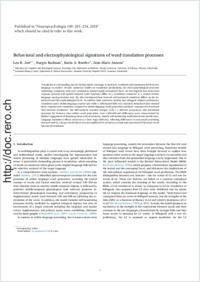Behavioral and electrophysiological signatures of word translation processes
- Jost, Lea B. Laboratory for Cognitive and Neurological Sciences, Neurology Unit, Department of Medicine, Faculty of Sciences, University of Fribourg, Switzerland
- Radman, Narges Laboratory for Cognitive and Neurological Sciences, Neurology Unit, Department of Medicine, Faculty of Sciences, University of Fribourg, Switzerland
- Buetler, Karin A. Leenaards Memory Center, Department of Clinical Neuroscience, Lausanne University Hospital CHUV, Lausanne, Switzerland
- Annoni, Jean-Marie Laboratory for Cognitive and Neurological Sciences, Neurology Unit, Department of Medicine, Faculty of Sciences, University of Fribourg, Switzerland
-
31.01.2018
Published in:
- Neuropsychologia. - 2018, vol. 109, p. 245–254
English
Translation is a demanding process during which a message is analyzed, translated and communicated from one language to another. Despite numerous studies on translation mechanisms, the electrophysiological processes underlying translation with overt production remain largely unexplored. Here, we investigated how behavioral response patterns and spatial-temporal brain dynamics differ in a translation compared to a control within-language word-generation task. We also investigated how forward and backward translation differs on the behavioral and electrophysiological level. To address these questions, healthy late bilingual subjects performed a translation and a within-language control task while a 128-channel EEG was recorded. Behavioral data showed faster responses for translation compared to within-language word generation and faster responses for backward than forward translation. The ERP-analysis revealed stronger early ( < 200 ms) preparatory and attentional processes for between than within word generation. Later (424–630 ms) differences were characterized by distinct engagement of domain-general control networks, namely self-monitoring and lexical access interference. Language asymmetry effects occurred at a later stage (600 ms), reflecting differences in conceptual processing characterized by a larger involvement of areas implicated in attention, arousal and awareness for forward versus backward translation.
- Faculty
- Faculté des sciences et de médecine
- Department
- Médecine 3ème année
- Language
-
- English
- Classification
- Biological sciences
- License
-
License undefined
- Identifiers
-
- RERO DOC 309037
- DOI 10.1016/j.neuropsychologia.2017.12.034
- Persistent URL
- https://folia.unifr.ch/unifr/documents/306464
Statistics
Document views: 112
File downloads:
- pdf: 223
